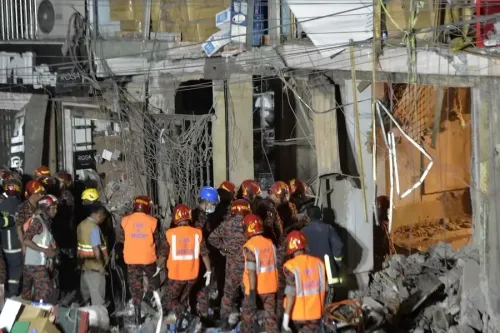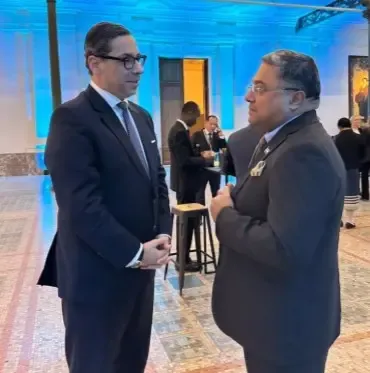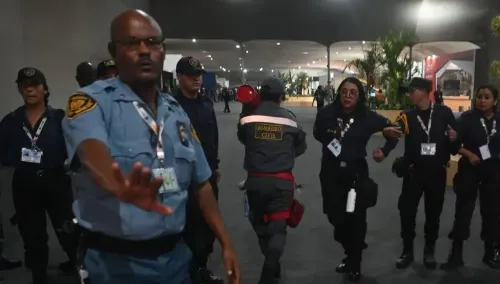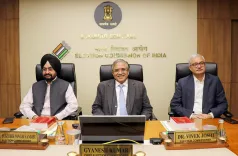India Utilizes Water Resources as a Strategic Weapon Against 'Rogue State' Pakistan
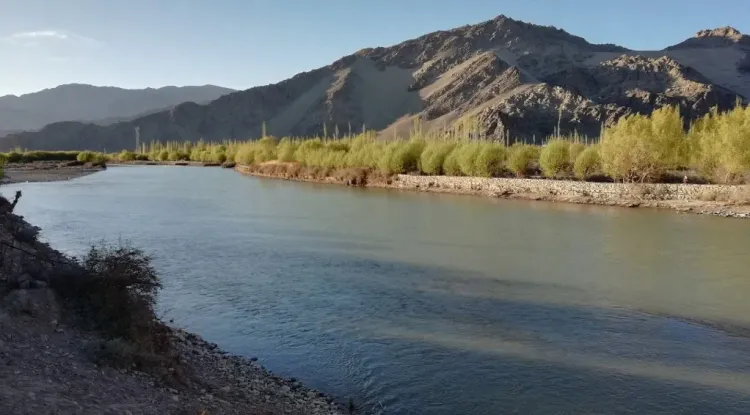
Synopsis
Key Takeaways
- India's suspension of the IWT is legally justified.
- Pakistan's violations have led to this decisive action.
- Water resources are being leveraged as a strategic tool.
- Significant economic repercussions for Pakistan are anticipated.
- India's development projects aim to restrict water flow to Pakistan.
New Delhi: India's decision to suspend the Indus Waters Treaty (IWT) is not only morally warranted due to ongoing cross-border terrorism but also legally justified because of repeated procedural breaches by Pakistan, several experts noted on Thursday.
This action represents a sovereign right taken to safeguard national interests, security, and the integrity of international agreements, which rely on reciprocity and mutual compliance.
"This move indicates that while India has consistently honored its international obligations, it will not allow itself to be taken for granted when the opposite party - a rogue state like Pakistan - repeatedly violates the spirit and terms of the agreement," one analyst commented.
Under the Indus Waters Treaty established between India and Pakistan in 1960, waters from three rivers - Ravi, Sutlej, and Beas - averaging around 33 Million Acre Feet (MAF) were designated for India’s exclusive use. Meanwhile, the waters of the Western rivers - Indus, Jhelum, and Chenab - averaging about 135 MAF were allocated to Pakistan, except for certain specified domestic, non-consumptive, and agricultural uses allowed for India as outlined in the Treaty.
Last August, India formally notified Pakistan requesting a review and modification of the IWT, citing "fundamental and unforeseen changes in circumstances" that necessitate a reassessment of obligations.
In the notice, India pointed out that, according to Article XII(3) of the IWT, provisions may be modified through a duly ratified Treaty concluded for this purpose between the two nations.
India's notification emphasized significant and unforeseen changes in circumstances that call for a reassessment of obligations under various Articles of the Treaty. Key concerns included demographic shifts; environmental issues - the need to enhance clean energy development to meet India's emission targets; and the impact of persistent cross-border terrorism, among others.
However, despite India's numerous warnings, Pakistan continued to violate treaty protocols.
The ultimate suspension of the treaty was prompted by ongoing violations, further exacerbated by national security threats, such as the recent Pahalgam terror attack on Tuesday, which resulted in the loss of 26 innocent lives.
The most significant breach occurred in 2016, when Pakistan unilaterally circumvented the treaty's graded dispute resolution mechanism outlined in Article IX of the IWT. This article mandates a gradual escalation — from technical discussions to neutral expert adjudication and, if necessary, to a Court of Arbitration.
In 2015, Pakistan initially sought a neutral expert to review technical objections to India’s Kishanganga and Ratle Hydro Electric Projects. However, it withdrew this request the following year and unilaterally approached the Court of Arbitration, violating the agreed dispute-resolution protocol. This intentional deviation undermined the legal integrity of the treaty and illustrated a tendency to politicize legal frameworks.
Recognizing this violation, India issued a formal notice to Pakistan on January 25, 2023, requesting modifications to the treaty to prevent the unilateral exploitation of the dispute resolution process. By utilizing diplomatic avenues and maintaining procedural fairness, India has exhibited responsibility and restraint.
Pakistan has also invoked the treaty's dispute resolution provisions three times, not always in good faith.
The first occasion involved objections to a hydropower project on the Chenab River in India-administered Kashmir. While Pakistan raised concerns that the project could grant Indian engineers undue control over river flows, the World Bank-appointed neutral expert ruled in favor of India in 2007, confirming the project's design and sediment management as being in line with international best practices.
India has already set the groundwork to tighten its grip on Pakistan through various projects.
The Kishanganga Hydroelectric Project on a tributary of the Jhelum was commissioned in 2018 and channels water from the Kishanganga River to a power facility in the Jhelum basin via a 23 km tunnel.
The Ratle Hydroelectric Project on the Chenab was revitalized in 2021 with an 850 MW capacity as Pakistan raised concerns over potential flow manipulation.
The Tulbul Navigation Project on the Jhelum has remained a focus since the 2016 Uri attack and can regulate water flow through a navigational lock-cum-control structure.
The Shahpurkandi Dam on the Ravi was approved in 2018 and is expected to be completed by early 2024. It restricts surplus water from flowing into Pakistan, enhancing irrigation and power generation in India.
Similarly, the Ujh Multipurpose Project on a Ravi tributary, announced in 2020, is currently in the planning phase, combining storage, irrigation, and hydroelectric objectives to reduce water flow to Pakistan.
This clearly indicates that while the IWT may only be temporarily suspended, pressure is already mounting on Pakistan.
These developments signify a deliberate effort by India to use water resources as a strategic tool in its geopolitical strategy towards Pakistan, which could have significant repercussions for terror sponsors across the border.
Pakistan is heavily reliant on the Indus River system for agriculture, with about 80 percent of its cultivated area - around 16 million hectares - depending on these waters. The agricultural sector accounts for 23 percent of Pakistan's national income and sustains 68 percent of its rural population. Reduced water availability could result in lower crop yields, food shortages, and economic instability.
The Indus basin also provides 154.3 million acre-feet of water annually, essential for irrigating vast agricultural regions and ensuring food security. Pakistan's water storage capacity is limited, with major dams like Mangla and Tarbela having a combined live storage of only around 14.4 MAF, which is merely 10 percent of Pakistan's annual water share under the treaty. The suspension aggravates these vulnerabilities by cutting off a guaranteed water supply.
The suspension of the IWT will also have profound economic repercussions for Pakistan, particularly in its agricultural and industrial sectors. It may also impair the country’s power generation capabilities, as hydropower is a vital source of electricity.

